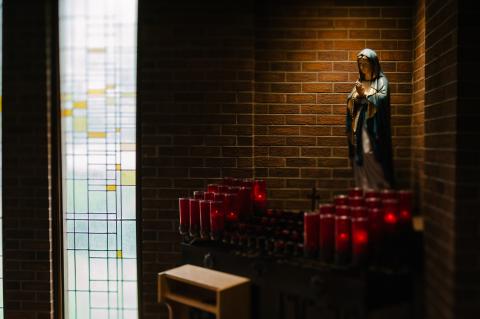Everyone Has a Right to Know their Mother

Everyone Has a Right to Know their Mother
I’m reading a lovely book-length interview with the preacher to the papal household, Fr. Raniero Cantalamessa.
He is someone I admire greatly. His life is a testament to openness to being surprised by the Holy Spirit.
In one section on ecumenism, he speaks of the many opportunities he has had to preach to Protestant communities at gatherings and retreats, and he speaks of one occasion of addressing my friends at Holy Trinity Brompton, the Anglican church where Alpha started.
'One time when I was giving a retreat to this community, I felt that the Lord was asking me to speak to them about Our Lady. I had never dared to talk about the Blessed Virgin to a Protestant audience before, and it seemed like a challenge for me, but I understood that the time had come to do it. I started by saying, “We Catholics are partly responsible for the difficulties you have about the Mother of God because, with our exaggerations and using Mary as something to throw in Protestants’ faces, we have made it more difficult for Mary to have affection from all her children. We therefore have a duty now to help you rediscover an appropriate attitude to the Lord’s mother.” I spoke for an hour about Our Lady to around a thousand people, all based on what the New Testament says about her. I have never seen the same emotional response in a Catholic audience. During the day I happened to overhear one lady say to another, “Don’t talk to me about what he said this morning because I will start crying again!”’
What an amazing encounter.
It reminds me of an encounter I had, also in London and also with members of this community. I was staying with a lovely, delightful Protestant couple on my visit, and one night over drinks they seized the opportunity to talk theology.
“Ok, you have to explain Catholic beliefs about Mary. Tell us about that.”
With such a wide opening as that, I didn’t know where to start! And in truth, a part of me wanted to dodge the question. Isn’t that terrible??
But I started to speak, trusting the Holy Spirit to work with my fumbled words. I spoke about what we believe about Mary and what we don’t believe about her (she is not God and not our saviour- she is a creature just like us!).
But she did play a pivotal role in the plan of salvation, and we can all revere her for her willingness to comply perfectly with God’s plan for her life.
We can all revere Mary for her willingness to comply perfectly with God’s plan for her life.
We spoke on the Immaculate Conception and why it makes sense for God to preserve her from sin; but that she herself still needed the Saviour she mothered! We talked of original sin, and the concept of a New Adam and New Eve.
I didn’t think I was articulate in the slightest, but I was amazed at their response.
“Wow. No one has ever spoken of this to us before!”
I believe the Holy Spirit guided that conversation in the way he prompted Fr. Raniero to speak to that audience.
Later on a saw an EWTN show on this topic, and in it the host Fr. Mitch and his guest Tim Staples spoke about how our Protestant brothers and sisters have sincere and authentic questions about what we believe about Mary.
And, they said, they have a right to an answer!
Everyone has a right to hear the Gospel. Everyone has a right to know Jesus our Saviour.
And connected to this, for those who are willing, everyone has a right to know their mother.
If you find yourself with an opportunity to talk about Mary to a Protestant Christian, here are 3 things you could start with.
1) We don’t regard Mary as a goddess or someone who is beyond human
We don’t worship her like God; that’s a serious heresy! She is a human being and thus a creature, created by God, like us. But we do revere her like a hero, and someone who continues to participate in God’s plan, in his very presence in heaven, through her prayers.
2) Mary is a model for us as someone who participated perfectly in God’s plan for her life
In her freedom, she could have said “No thanks” when given the opportunity to be the mother of our Saviour. Her “yes” changed the world. Our “yes” to God can also change the world in the way God plans for us. We should recall that often; God saw fit to include human beings in his plan for the salvation of the world, and he still includes us in bringing the message of salvation to others.
3) Mary isn’t meant to take away attention from Jesus, but to draw attention to Him
As it says in the Vatican II document Lumen Gentium:
For no creature could ever be counted as equal with the Incarnate Word and Redeemer. Just as the priesthood of Christ is shared in various ways both by the ministers and by the faithful, and as the one goodness of God is really communicated in different ways to His creatures, so also the unique mediation of the Redeemer does not exclude but rather gives rise to a manifold cooperation which is but a sharing in this one source.
The Church does not hesitate to profess this subordinate role of Mary. It knows it through unfailing experience of it and commends it to the hearts of the faithful, so that encouraged by this maternal help they may the more intimately adhere to the Mediator and Redeemer. (62)
That we may more intimately adhere to the Mediator and Redeemer, we echo the salutation of Gabriel and ask Mary’s help.
Hail Mary, full of grace...
When our Protestant brothers and sisters ask us about Mary, they have a right to an answer!
Tweet Quote
Join the Converstation
We encourage and appreciate your comments and discussion on this site. Please remember to be charitable in disagreement. We reserve the right to remove comments that are deemed hurtful or excessively vulgar.



